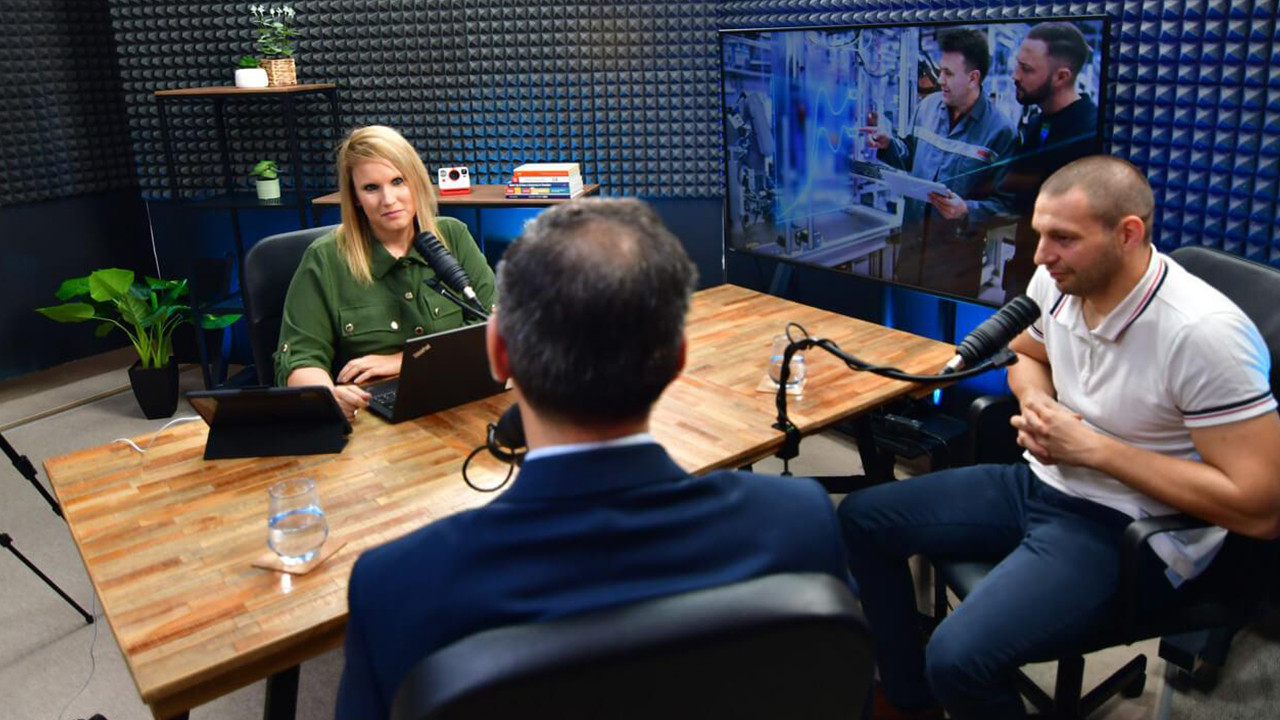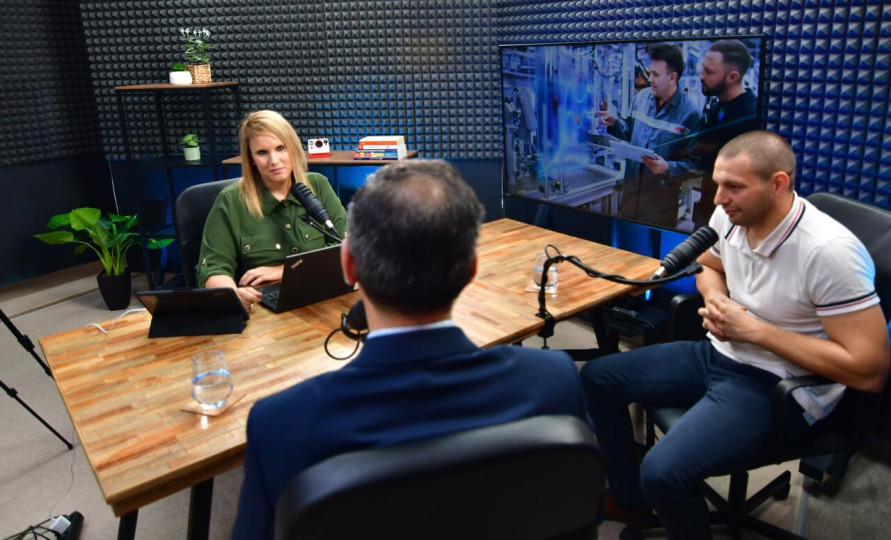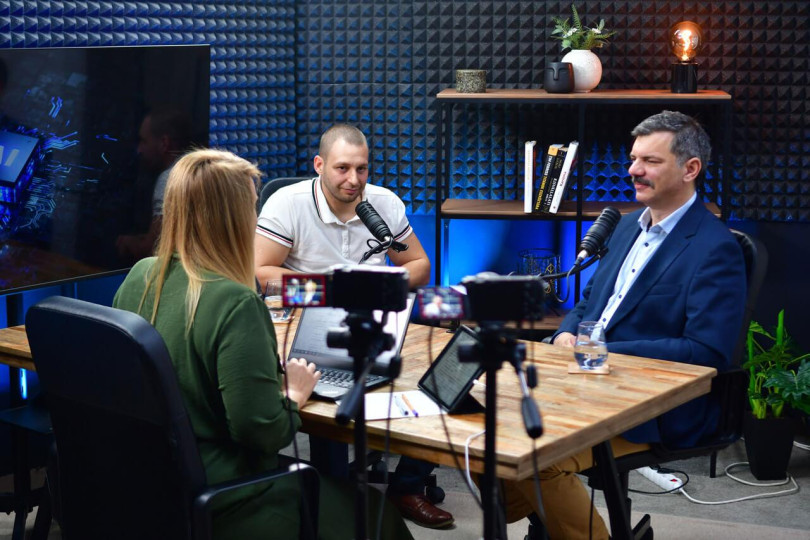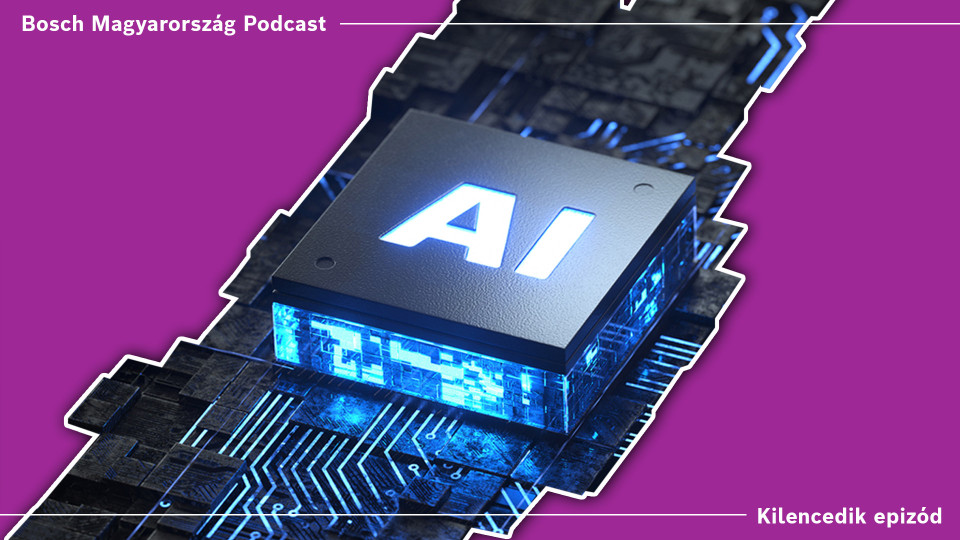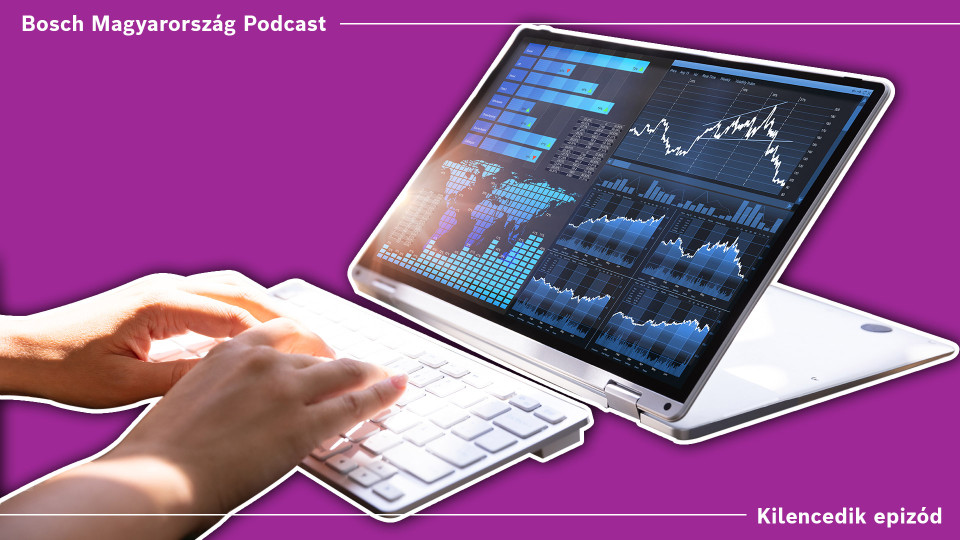Artificial intelligence is shaping our daily lives at a dizzying pace. Those who miss out are likely to be left behind. Companies that fail to take advantage of the potential offered by AI could quickly find themselves at a competitive disadvantage. In what areas is the dominant technology of our time unbeatable, and what is it not suitable for? Is AI hallucinating and what should we look out for when working with it? Is it really taking our jobs and what can we do about it? The answers are sought by the expert guests of the latest Bosch Hungary Podcast.
Artificial intelligence: investing in the future
Today, there is no question that AI will revolutionize our everyday lives, just as there is no question that ChatGPT is just the tip of the iceberg: AI currently holds the most potential in the areas of industry and manufacturing. Major economic players agree that it is worth investing in AI-based developments if they want to remain competitive. In the latest edition of the Bosch Hungary Podcast, Edit Tóth, digital media manager of the Bosch Group in Hungary, talks to Balázs Porteleki, AI Project Manager of the Bosch Group in Hungary, and Gergely Kiss, IT engineer-teacher and founder of Attrecto Zrt.
2024: no Bosch product without AI
The past year has been dominated by the rise of ChatGPT in the field of artificial intelligence, while AI technology is playing an increasingly important role in industrial innovation and manufacturing. Bosch has been at the forefront of the development and application of industrial AI for many years. By the end of 2023, all Bosch products either use AI or AI is used in their production, said Balázs Porteleki.
Data leakage and hallucination: what to look out for when using AI?
As AI technology advances, data protection is becoming an increasingly prominent issue, especially in R&D and manufacturing. In the podcast, participants discuss a case where developers at a well-known Asian digital company tried to use ChatGPT to fix their code, and although the operation was successful, the company's confidential industrial data was leaked to ChatGPT's public servers. User awareness is essential to avoid similar incidents. Care should also be taken to use AI systems with due caution, recognizing AI 'hallucinations', i.e. confident but unsubstantiated responses.
Unbeatable quality
Flying an airplane or operating on a patient based on AI responses is not advisable, but there are some applications where AI is almost unbeatable. In industry, AI can currently play a key role in troubleshooting, error prevention, quality assurance and product control, as well as in optimizing supply chain management, summarizes Gergely Kiss. In the aerospace industry, a predictive technique has been in use for some time to predict the expected failure based on changes in the vibration frequency of engines and to correct it before it occurs. This approach, with the help of artificial intelligence, can now be applied to entire manufacturing processes and can predict and prevent failures that would otherwise cause costly problems or downtime.
The Bosch Group in Hungary also has many examples of AI-based quality control, with AI-based defect prediction systems now available at all of the company's Hungarian sites, explains Balázs Porteleki, expert at Bosch. This can improve product quality, reduce the chance of future failures, and improve overall production efficiency.
Transforming people's work, not taking it away
The invited experts agree that AI does not take away people's jobs, it transforms them. Monotonous, routine tasks can be performed faster and more accurately in the future with the help of AI. The focus of human tasks will shift to higher value-added activities, to process planning, control, and validation of AI. One thing is for sure, a skilled workforce, in both physical and intellectual areas, will be in great demand in the factories of the future.
But what can those who still want to anticipate change and secure their future in the labor market do? In the Bosch podcast, Gergely Kiss quotes a common thought among experts on the importance of continuous development and learning: “Your job will not be taken by artificial intelligence, but by another person who uses AI systems well.”
Artificial intelligence for sustainability
Besides the economic benefits, can we do anything for our environment and sustainability with AI? One such area is energy use, which can be optimized with AI. Materials science is another area where AI can play a role in the development of environmentally friendly new materials and their sustainable production.
Bosch and BASF have jointly developed a smart sprayer that uses machine learning, a form of artificial intelligence, to control where and how much chemical to spray. This means that up to 60-70% less pesticide can be applied compared to conventional methods, which helps farmers and protects the environment at the same time, emphasized Balázs Porteleki, an expert at Bosch.
Bosch Hungary Podcast: technology in plain language
The Bosch Hungary Podcast a quarterly show on the most current issues in innovation and R&D, with expert guests providing clear answers to the most pressing questions about the technology of the future. Those who want to learn about the present and future of artificial intelligence, can watch the show on YouTube or listen to it on Bosch Hungary's Spotify, Apple Podcasts, Google Podcasts and Simplecast podcast channels!
Zita Hella Varga
Phone: +36 70 667-6374
Bosch has been present in Hungary since 1898 with its products. After its re-establishment as a regional trading company in 1991, Bosch has grown into one of Hungary’s largest foreign industrial employers with currently eight subsidiaries. In fiscal 2022 it had total net sales of 2.255 billion forints and consolidated sales to third parties on the Hungarian market of 314 billion forints. The Bosch Group in Hungary employs more than 18,300 associates (as of December 31, 2022). In addition to its manufacturing, commercial and development business, Bosch has a network of sales and service operations that covers the entire country.
The Bosch Group is a leading global supplier of technology and services. It employs roughly 428,000 associates worldwide (as of December 31, 2023). According to preliminary figures, the company generated sales of 91.6 billion euros in 2023. Its operations are divided into four business sectors: Mobility, Industrial Technology, Consumer Goods, and Energy and Building Technology. As a leading IoT provider, Bosch offers innovative solutions for smart homes, Industry 4.0, and connected mobility. Bosch is pursuing a vision of mobility that is sustainable, safe, and exciting. It uses its expertise in sensor technology, software, and services, as well as its own IoT cloud, to offer its customers connected, cross-domain solutions from a single source. The Bosch Group’s strategic objective is to facilitate connected living with products and solutions that either contain artificial intelligence (AI) or have been developed or manufactured with its help. Bosch improves quality of life worldwide with products and services that are innovative and spark enthusiasm. In short, Bosch creates technology that is “Invented for life.” The Bosch Group comprises Robert Bosch GmbH and its roughly 470 subsidiary and regional companies in over 60 countries. Including sales and service partners, Bosch’s global manufacturing, engineering, and sales network covers nearly every country in the world. The basis for the company’s future growth is its innovative strength. At 136 locations across the globe, Bosch employs some 90,000 associates in research and development, of which roughly 48,000 are software engineers.
Additional information is available online at www.bosch.hu, iot.boschblog.hu, www.bosch.com, www.iot.bosch.com, www.bosch-press.com, www.twitter.com/BoschPresse

